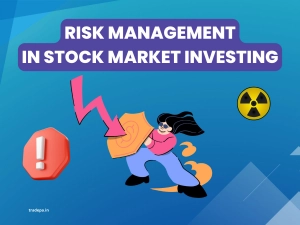Investing in Technology and Innovation

Introduction
Technology and innovation drive progress, creating new industries and transforming existing ones. They increase productivity, improve efficiency, and open new opportunities for businesses and individuals. As technology evolves rapidly, its influence on economic growth becomes more pronounced, making it an essential focus for investors.
There are several reasons why investors are increasingly drawn to the tech sector.
- First, the potential for high returns is significant. Many technology companies have experienced exponential growth, providing substantial profits to their investors.
- Technology and innovation are constantly pushing boundaries, leading to disruptive advancements that can reshape entire industries. This constant evolution presents numerous opportunities for those investing early in emerging technologies.
- Furthermore, the tech sector often leads the market in innovation, offering unique investment opportunities not available in other sectors.
However, investing in technology and innovation also comes with its own set of risks and challenges. The fast-paced nature of technological advancements means that today's leading technology can quickly become obsolete. Investors must stay informed and be willing to adapt their strategies as new trends emerge. Additionally, regulatory issues, cybersecurity threats, and market volatility can impact the performance of tech investments.
Definition and Scope of Technology and Innovation Investments
Investing in technology and innovation involves allocating resources to companies and sectors at the forefront of technological advancements. This can include direct investments in tech companies, purchasing stocks, or investing in tech-focused mutual funds or exchange-traded funds (ETFs). The scope of technology and innovation investments is broad, encompassing everything from established tech giants like Apple and Google to emerging startups developing cutting-edge technologies.
- Technology Investments: Typically focus on companies developing new hardware, software, or digital services.
- Innovation Investments: Broader in scope, often including any company leveraging new technologies to improve its products or services.
Investors should understand that technology and innovation are not confined to the tech industry alone. Technological advancements are transforming many traditional industries, such as healthcare, finance, and manufacturing, making them part of this investment landscape.
Key Sectors: AI, Biotech, Fintech, and More

Several key sectors stand out within the tech investment landscape, each offering unique opportunities and challenges:
- Artificial Intelligence (AI): AI is revolutionizing industries by automating processes, enhancing data analysis, and enabling more intelligent decision-making. Investments in AI can range from software companies developing AI algorithms to hardware firms creating AI chips.
- Biotechnology (Biotech): Biotech companies are at the forefront of medical research, developing new treatments and drugs. This sector is crucial for investors interested in healthcare innovations.
- Financial Technology (Fintech): Fintech is disrupting traditional banking and financial services with innovations like digital payments, robo-advisors, etc. Investments in fintech can provide exposure to the evolving financial landscape.
- Other Sectors: Include cybersecurity, renewable energy technology, and e-commerce, all of which are experiencing significant growth and innovation.
Each of these sectors has its own dynamics and risk factors, requiring investors to conduct thorough research before committing their funds.
Benefits of Investing in Technology and Innovation

A. High Growth Potential and Lucrative Returns
Investing in technology and innovation offers the potential for significant financial returns. Many tech companies have shown rapid growth and expansion, often outpacing traditional industries. This high growth potential attracts investors seeking opportunities to increase their wealth over time.
- Exponential Growth: Companies like Amazon, Apple, and Google have seen their stock prices skyrocket, delivering substantial returns to early investors.
- Emerging Markets: New technologies, such as artificial intelligence and blockchain, create new markets, providing fresh investment opportunities.
- Innovative Startups: Investing in startups can be risky, but it also offers the chance to get in on the ground floor of the next big tech revolution.
B. Driving Progress and Shaping the Future
Investing in technology and innovation is not just about financial gain; it's also about contributing to the future. Technological advancements drive significant progress across various fields, from healthcare to education to environmental sustainability. By investing in tech, you are supporting the development of solutions that can profoundly impact society.
- Healthcare Innovations: Investments in biotech and medical technology can lead to treatments and patient care breakthroughs.
- Environmental Impact: Green technologies and renewable energy innovations are essential for addressing climate change and promoting sustainability.
- Societal Advancements: Technology can enhance education, improve accessibility, and connect people globally, fostering a more inclusive and informed society.
These contributions help shape a better future, aligning financial interests with positive societal impact. This dual benefit makes tech and innovation investments appealing to socially conscious investors.
C. Enhancing Efficiency and Productivity Across Industries
Technology and innovation are powerful tools for enhancing efficiency and productivity across various sectors. Investing in tech supports developments that streamline processes, reduce costs, and improve overall performance.
- Automation: Technologies like AI and robotics automate repetitive tasks, allowing businesses to operate more efficiently.
- Data Analytics: Advanced data analytics tools enable companies to make better, data-driven decisions, improving their competitiveness and profitability.
- Improved Connectivity: Communication and information technology innovations help businesses collaborate more effectively, speeding up processes and reducing errors.
For investors, these efficiency gains translate into better-performing companies and industries, which can lead to higher returns on investment.
Risks and Challenges in Tech Investments
1. Market Volatility and Unpredictability
Investing in technology and innovation can yield significant rewards, but it also comes with significant market volatility and unpredictability. The tech sector is known for its rapid changes, driven by continuous advancements and shifts in consumer preferences.
- Rapid Price Fluctuations: Tech stocks can experience large swings in value over short periods, influenced by factors such as earnings reports, product launches, and market sentiment.
- Economic Cycles: The tech industry can be more sensitive to economic cycles, where downturns can lead to sharp declines in tech stock prices.
- Investor Sentiment: Market reactions to news about technological advancements or failures can be swift and significant, impacting stock prices.
For beginner investors, it's crucial to be aware of these potential fluctuations and to adopt strategies that mitigate risk, such as diversifying investments and maintaining a long-term perspective.
2. Regulatory and Ethical Concerns
Another challenge in tech investments is navigating regulatory and ethical concerns. Governments worldwide are increasingly scrutinizing tech companies, particularly regarding data privacy, cybersecurity, and antitrust laws. These regulatory pressures can impact a company's operations and profitability, posing risks to investors.
- Data Privacy Regulations: Laws such as the General Data Protection Regulation (GDPR) in Europe impose strict requirements on how companies handle personal data, affecting tech businesses globally.
- Antitrust Actions: Major tech firms may face antitrust lawsuits aimed at curbing monopolistic practices, which can lead to fines, operational changes, and even breakups of companies.
- Ethical Dilemmas: AI ethics, misinformation, and the environmental impact of tech production are increasingly in the spotlight, influencing public perception and regulatory actions.
Investors must stay informed about regulatory developments and consider how they impact their tech investments.
3. Technological Obsolescence and Competition
Technological obsolescence and intense competition are inherent risks in the tech sector. The fast-paced nature of technological advancement means that today's cutting-edge products can quickly become outdated. Companies must continually innovate to stay relevant, which can be a financial and strategic challenge.
- Rapid Innovation Cycles: New technologies can render existing products obsolete, requiring companies to invest heavily in research and development to keep up.
- Competitive Pressure: The tech industry is highly competitive, with many players vying for market share. This competition can result in price wars, decreased profit margins, and heightened expenditures on marketing and innovation.
- Startup Disruptions: Small, agile startups can disrupt established companies with innovative products and services, shifting market dynamics.
Evaluating Tech Companies
Financial Health
Assessing tech companies' financial health is paramount when evaluating them for investment. Key financial metrics include revenue growth, profitability, and cash flow. These indicators provide insight into the company's current performance and future potential.
- Revenue Growth: Consistent revenue growth is a strong indicator of a tech company's success. It shows that the company can attract and retain customers and that its products or services are in demand.
- Profitability: Profitability metrics, such as net income and profit margins, indicate how efficiently a company operates. High profitability means the company is good at converting revenue into actual profit. Evaluating profitability helps investors understand if the company can sustain its operations and growth.
- Cash Flow: Positive cash flow, mainly operating cash flow, is crucial for a tech company's sustainability. Free cash flow after capital expenditures is also a key metric, as it indicates the amount of money available for further investment or returning value to shareholders.
Innovation Capacity
A tech company's innovativeness is a critical factor in its long-term success. Innovation capacity can be evaluated by looking at its investment in research and development (R&D) and its intellectual property (IP) portfolio.
- R&D Investment: Companies that invest heavily in R&D are often more innovative and better positioned to develop new products and technologies. Investors should look for a significant portion of the company's budget allocated to R&D.
- Intellectual Property: A strong portfolio of patents, trademarks, and copyrights can give a tech company a competitive edge. Intellectual property protects the company's innovations from being copied by competitors, allowing it to maintain a unique position in the market. Investors should consider the quality and breadth of a company's IP portfolio when evaluating its innovation capacity.
Market Position and Competitive Advantage
Understanding a tech company's market position and competitive advantage is essential for assessing its long-term viability. This involves examining the company's market share, the strength of its brand, and its overall competitive strategy.
- Market Share: High market share can indicate strong brand recognition, customer loyalty, and the capability to establish industry standards. Investors should look for companies that dominate or show strong potential to increase their market share.
- Brand Strength: A powerful brand can be a significant competitive advantage, attracting customers and talent and creating a barrier to entry for competitors. Companies with strong brand recognition often have loyal customers and can command premium pricing for their products or services.
- Competitive Strategy: It is crucial to understand how a company differentiates itself from its competitors. This might include unique technology, superior customer service, or cost advantages. Companies with a clear and effective competitive strategy are better equipped to maintain and grow their market position.
Future Outlook
Predicting the Next Big Tech Trends
Predicting the next significant tech trends involves understanding current advancements and anticipating how they might evolve.
- Artificial Intelligence (AI): AI continues to grow and integrate into various industries. Future advancements could lead to more sophisticated AI applications like autonomous vehicles, advanced robotics, and AI-driven healthcare solutions.
- Quantum Computing: It is still in its infancy, but it promises to revolutionize fields like cryptography, materials science, and complex system simulations. Investors who keep an eye on this technology could find significant opportunities as it develops.
- 5G and Beyond: The rollout of 5G networks enhances connectivity and enables new technologies like the Internet of Things (IoT) and smart cities. Future generations of mobile networks will likely continue this trend, further driving tech innovation and investment potential.
Investors should stay informed about these and other emerging technologies, understanding how they might transform industries and create new markets.
Regulatory Changes and Government Policies
Government policies and regulations play an important role in the tech investment landscape. Understanding these changes is crucial for making informed investment decisions.
- Data Privacy and Security: Amid growing concerns about data breaches and privacy, governments worldwide are implementing stricter data protection regulations. These laws can affect how tech companies operate and invest in cybersecurity measures.
- Antitrust Regulations: Major tech companies are often subject to antitrust scrutiny, leading to legal challenges, fines, and operational changes. Investors must know these regulatory risks and how they might impact company performance.
- Support for Innovation: On the positive side, many governments invest in tech innovation through grants, subsidies, and favourable tax policies. These initiatives can spur growth in certain sectors, providing opportunities for investors.
Staying updated on regulatory trends and government policies can help investors navigate potential risks and capitalize on supportive measures.
Opportunities and Challenges
The tech investment landscape continuously evolves, presenting investors with opportunities and challenges for investing. These dynamics can help investors make more strategic decisions.
- Opportunities: The rapid pace of innovation creates numerous investment opportunities. New technologies, startups, and emerging markets offer the potential for high returns. Sectors like renewable energy tech, biotechnology, and fintech are poised for significant growth.
- Challenges: Alongside opportunities, there are challenges to consider. Market volatility, technological obsolescence, and intense competition can pose risks to tech investments.
- Strategic Approaches: To navigate these opportunities and challenges, investors should adopt a diversified approach, spread their investments across various tech sectors, and stay informed about market trends and technological advancements. Keeping a long-term perspective can also help mitigate short-term volatility and focus on sustained growth.
Conclusion
Recap of Key Points and Takeaways
Investing in technology and innovation offers exciting opportunities for growth and high returns. We have explored various aspects of tech investments, from understanding the tech landscape and evaluating companies to recognizing the benefits and navigating the risks. Key points include:
- The high growth potential of tech sectors.
- The importance of financial health and innovation capacity in evaluating companies.
- The impact of regulatory changes.
We also discussed the significance of staying informed about emerging technologies and market trends. These insights can help beginner investors make better-informed decisions and capitalize on the dynamic world of tech investments.
Importance of Continuous Learning and Staying Updated
Staying updated on the latest advancements, market trends, and regulatory changes can significantly impact investment decisions. Investors should regularly read industry news, follow market reports, and consider educational resources such as webinars, courses, and investment seminars. Engaging with tech communities, attending conferences, and networking with experts can provide valuable insights. By committing to ongoing education, investors can better understand the complexities of the tech sector and identify promising opportunities early.
Encouragement to Embrace Innovation While Managing Risks
Embracing innovation is key to success in tech investments. Investing in cutting-edge technologies and forward-thinking companies can lead to substantial rewards. Diversification is crucial, as it spreads investments across different tech sectors and companies to mitigate potential losses. Investors should also maintain a long-term perspective, as the tech industry can be volatile in the short term. Thorough research and careful evaluation of companies' financial health, innovation capacity, and market position can further reduce risks. By balancing enthusiasm for innovation with prudent risk management, beginner investors can confidently navigate the exciting realm of technology and innovation investments.








